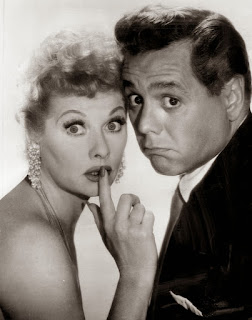Anyone who ever watched I Love Lucy — and that’s a lot of us — should probably sit themselves down and watch “Being the Ricardos”.
Two new factoids that got my attention:
- Stores used to stay open late on Monday nights, but switched to Thursdays because so many people stayed home to watch I Love Lucy.
- The show drew 60,000,000 viewers in a country of 150 million (40 percent of the entire population).
The history is important and you will probably learn some things about Lucy and Ricky Ricardo as people, about their rocky and complicated relationship, about the show and how it worked behind the scenes, about the times they lived in, and about how revolutionary that show was due mainly to the live performance genius of Lucy and to the business savvy of Desi.
Everyone already knows that Lucille Ball was one-of-a-kind — but Desi Arnaz was no slouch either, a funny, charismatic, and talented natural leader who by his late teens was already an established musician playing in Xavier Cugat’s band in Miami and then with his own Desi Arnaz Orchestra in the late 30s in the New York City clubs, where he introduced conga line dancing. He starred in his first movie in 1939 at just 22 years old.Not bad for a guy who had to flee to America at age 16 with his family — formerly wealthy and socially and politically powerful — who lost everything after the Batista-led Cuban Revolution of 1933. He had to start over, with nothing, in a new country with a foreign culture and language, after growing up in the lap of luxury.
The seeds for I Love Lucy were formed from a combination of two driving forces: (a) CBS wanted to make a TV version of Lucy’s popular radio show of the late 1940s, “My Favorite Husband”, and (b) a vaudeville show that Lucy and Desi launched together on the road in 1950 using the same radio show team of writers, which was wildly popular and proved to the network that the audience was ready for and could believe in the two of them as a couple (CBS had wanted her radio co-star as her TV husband but she insisted on Desi to keep them together more, as her family life while growing up had been less than ideal, raised by her grandfather after her father died young and her mother essentially abandoned the kids).
They formed their revolutionary company Desilu Productions in 1950 to produce the vaudeville show, but they really set the bar high when they (a) produced the TV show to keep creative control and (b) introduced using three cameras all the time, (c) using film instead of just broadcasting live locally (and then in kinescope to the rest of the country) which (d) enabled them to show the same quality broadcast to the entire country and (e) monetize future reruns in syndication for decades. Oh, and (f) they did all this from a true movie-style soundstage with a live audience — Lucy needed the live audience to be at her best and they knew that — which had never been done before.
All of that, first time ever, by anyone. Desi made it all happen via excellent negotiating skills, a relentless can-do attitude, and sheer force of will as a natural leader.
The company completely flipped the structure of how TV shows worked, forever. Desilu went on to produce The Untouchables, Mission: Impossible, Star Trek, and other shows.
One thing became clear from my reading up on all this history: Desi Arnaz was a creative and business genius who really should have gotten far more credit as a real force in Hollywood. I suspect if he seemed a little less Cuban, that might have been different.
